|
|


|
Links to Africa
Gateway-K
|
|
To have a
PAN-AFRICA-RELATED-URL
added to this unique collection, please forward an e-mail request to the LinkMaster for consideration.
|
LINKMASTER
Click on links in Alphabetic order
1 2 3
A B C
D E F
G H I
J K L
M N O
P Q R
S T U
V W X
Y Z
All rights reserved!
|
Africa related Pages
Click and Go
|
[ LINK-K ]
Links starting with K
|
|
Kalahari
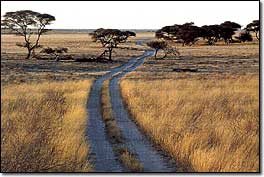
|
Situated right in the centre of Botswana, larger than Denmark or Switzerland, and bigger than Lesotho
and Swaziland combined, the 52,800 square kilometre Central Kalahari Game Reserve, which was
set up in 1961, is the second largest game reserve in the world.
|
Mory Kanté
(Born: 1950)
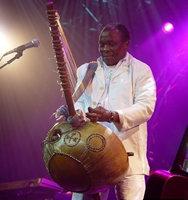
|
Mory Kanté by life is a legendary West African singer and kora player. He inherited the griot tradition from the
Jalis of Mande. The talented griot from Guinea in West Africa
was the first African artist to sell a million singles with 'Yéké Yéké', which topped the European charts.
In 2000, Leonardo Di Caprio called upon Mory Kanté for the musical track of his film, The Beach, which includes
a remix of ‘Yéké Yéké’.
|
|
Kaone Kario
Face of Africa 2005
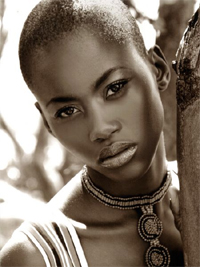
|
On Sunday, July 10 2005, in Sun City, Johannesburg, South Africa, 19-year old Kaone Kario, beat nine other
contestants to become the 'Nokia Face of Africa 2005. Kaone believes everything in life has a reason
and that God chooses your path for you. She feels modelling is her career for now, "it’s the right place for the meantime."
|
|
KENNETH D. KAUNDA
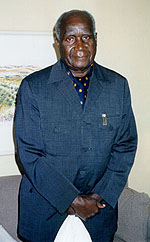
|
Founding President of Zambia Dr. Kenneth Kaunda, helped emancipate the Southern African region from colonial dictators. Without Dr. Kaunda, Nelson Mandela would still have been in prison. Kaunda gave refuge to ANC and the freedom fighters. Namibia was liberated because of Kaunda. He played a major role in freeing Namibia from South African colonialists. Angola and Mozambique were liberated from Portuguese colonialists in 1975 because of this son of Africa, Kenneth Kaunda. The contributions to African renaissance by Kenneth Kaunda are so many...
|
|
Liya Kebede
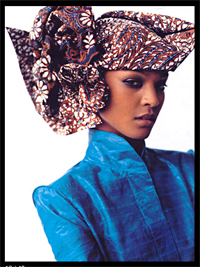
|
Liya Kebede is a supermodel born and raised in Addis Ababa, Ethiopia. As a young woman,
Liya did modeling in her native Ethiopia. She has remarked that the modeling industry in
that country is quite different from the European catwalks from which she is now seen ubiquitously.
In Ethiopia, she had to provide her own shoes for each runway show. While in school at the French
Lycee, a film director spotted Liya and introduced her to a French modelling agent.
After completing her studies, she moved to France to pursue work through a local Parisian agency.
After a short time, Liya re-located to NYC where she currently resides with her husband Kassy Kebede.
She has been seen on the covers of Italian, Japanese and Spanish Vogue, V, French, Flair, i-D and Time's
Style & Design. She is one of a very few ethnically African models featured in major fashion photo
shoots and runway shows. She is often used in haute couture and other high-class clothing campaigns.
|
Salif Keita
(Born: 1949)
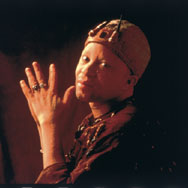
|
Salif Keita, born in 1949 in Djoliba, is sometimes called the Golden Voice of Africa. He is a direct descendent of Sundiata Keita, the Mandinka warrior king who founded the Malian empire in the 13th century. Born an albino - a sign of bad luck - Keita was shunned and ostracized by his family and community alike. In 1967 he moved to Bamako where he began playing in nightclubs with one of his brothers. Two years later he joined the 16 member, government sponsored Rail Band that played at the Bamako railway station's Buffet Hotel de la Gare - a very choice gig at the time. In 1973 he left the Rail Band along with Kante Manfila (guitarist, composer, and leader of the band) to join Les Ambassadeurs. By 1977, with Keita and Les Ambassadeurs reputation extending beyond the boundaries of Mali, he was awarded the National Order of Guinea by President Ahmed Sekou Toure. In return, Keita composed Mandjou, telling the history of the Mali people and praising Sekou Toure. This hauntingly beautiful song features Keita's typical sound of guitar, organ, and sax. To see him perform it concert is an occasion you will never forget. By 1984 Keita had relocated to Paris in order to reach a wider, more European audience, where he joined other African stars like Mory Kante, Toure Kunda, Tabu Ley Rochereau, Ray Lema, Papa Wemba, and Manu Dibango among many others. He now lives in the Montreuil section of Paris among the some 15,000 Malians there. Keita's music blends together the traditional griot music of his Malian childhood with other West African influences from Guinea, the Ivory Coast, and Senegal, along with influences from Cuba, Spain, and Portugal, and an unmistakably overall Islamic sound. Besides the aforementioned guitar, organ, and sax, Keita's sound also includes traditional African instruments such as the kora, balafon, and djembe, often synthesized and sampled.
|
Kenkey-House
(Born: 1949)

|
Back to the Roots, Restaurant "Essen" à la Mamma. A Ghana Restaurant at Gutleutstrasse 145 - 60329 Frankfurt/M - Germany.
Ghanesische Küche mit Geschmack und Raffinesse.
Das kleine Restaurant am Rande des Hauptbahnhofs in der Gutleutstraße ist noch ein Geheimtip.
Zu unglaublich niedrigen Preisen wird hier richtig gutes Essen auf die randvollen Teller gezaubert.
|
|
Kent2Capetown
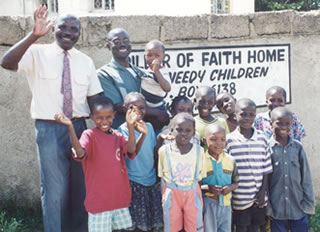
|
U.K. CHARITY EXPEDITION 2001
On the 4th August 2001 the team left on an overland journey from Demelza House in Kent and drive through seventeen countries in order to reach Cape Town, South Africa. Their primary aim is to raise funds for Demelza House, however, the journey will be broken three times in order to work at African children’s hospices with a view to establishing sustained support from the UK.
|
|
VISIT KENYA
|
Experience its biodiverse game and marine parks, biosphere reserves, archeological sites, awe inspiring scenic beauty, pearly white sandy beaches, coral reef sheltered waters, green palms swaying with the breeze, world class hotels, sparkling cocktails and sumptuous international cuisine.
|
Jomo Kenyatta
(1898- 1978)
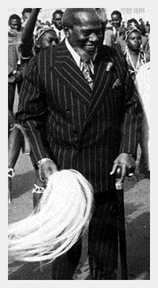
|
Kenyan leader Jomo Kenyatta was educated at a Scot's Mission School. From 1931 to 1944 he lived in Great Britain, and attended the London School of Economics for one year.
On his return home, Kenyatta worked for Kenyan Independence. He headed the New Kenya Africa Union. He was arrested by the British and spent the years 1952-58 in jail.
Four years later, the Kenyan African National Union -- headed by Kenyatta -- won the elections that followed Kenya's Independence. Kenyatta was President of Kenya until his death.
|
|
BAN KI-MOON
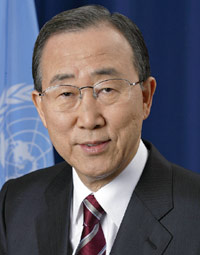
|
Ban Ki-moon of the Republic of Korea, the eighth Secretary-General of the United Nations, brings to
his post 37 years of service both in government and on the global stage. Mr. Ban was born on 13 June 1944. He and his wife,
Madam Yoo (Ban) Soon-taek, whom he met in high school in 1962, have one son and two daughters. In addition to Korean, Mr. Ban speaks English and French.
Mr. Ban has received numerous national and international prizes, medals and honours. In 1975, 1986 and again in 2006,
he was awarded the ROK’s Highest Order of Service Merit for service to his country.
|
|
Mount Kilimanjaro

|
Mount Kilmanjaro is is a volcano that is no longer active, located at the north/eastern tip of Tanzania. It is the continent's largest peak. Although Kilmanjaro is located near the equator, it is so high that its peak is always covered with snow.
|
|
Simon Kimbangu
(1889 - 1951)
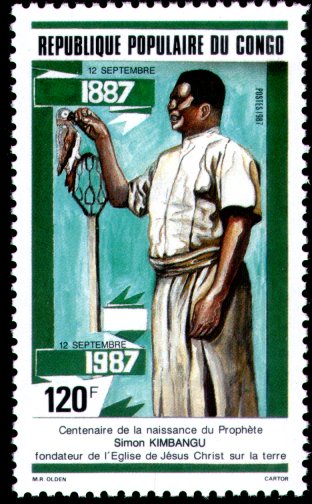
|
Simon Kimbangu was born in 1889 in a town that used to be called Nkamba in what was then called the Congo Free State of Central Africa. Simon Kimbangu, like his country was a slow starter and spent his first thirty-two years as an ordinary mortal. Managing to avoided death from malnutrition, disease or violence, he raised three sons and found enough food and enough of the old Baptist faith to keep his family fed and out of too much trouble until April 1921. Then in the brief period of six months he became a new-wave prophet, started a separatist church, took to the road as a preacher, cured the sick, raised the dead and rallied the local people against the strict Christian missions and, as he saw it, the corrupting European culture. It took the Belgian authorities until September to realise that Simon was a going to be a bit of a problem so, proving exactly what Simon had been saying all along, arrested him on a (phoney) public disorder charge and threw him in jail. For life. There are Africans alive at this writing who were brought back from the dead by Simon Kimbangu, and there are people still living who watched him do it. The claim is that Simon Kimbangu healed the sick, made the lame walk, returned sight to the blind and hearing to the deaf, and even brought an infant dead three days back to life. Kimbangu performed these miraculous deeds over a period of five months, from May, 1921, through September 12, 1921. Naturally the deportations had exactly the opposite effect and although Simon died in prison in October 1951 his dispossessed followers spread the word in all the new places and by 1959 the Kimbanguist Church, now led by Simon's youngest son Joseph, had to be formally recognised. Simon Kimbangu is now firmly established as a dead prophet and the town of Nkamba is now called (by the Kimbanguist Church anyway) New Jerusalem. Their doctrine is so attractive that the church is now spread widely throughout central Africa and has an active, if somewhat dull, membership of well over three million.
|
|
Martin Luther King

|

"The King Center is a nonprofit organization that educates the world about Dr. Martin Luther King, Jr.'s philosophy and methods of nonviolence in order to create the Beloved Community". The King Center is making significant progress in its long-range mission to spread the teachings of Martin Luther King, Jr. to a broader, global constituency. In addition, it has made dramatic improvement in the Center’s capacity to coordinate the efforts of Dr King's followers in the U.S. and around the world to help fulfill his Dream.
|
King Sunny Ade
(Born: 1946)
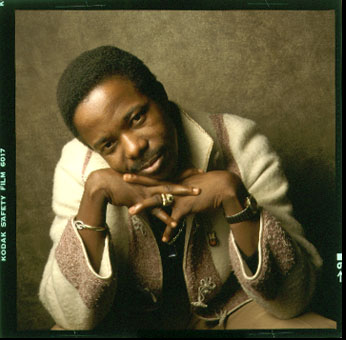
|
King Sunny Ade, sometimes also called the Minister of Enjoyment, was born in Oshogbo, Nigeria in 1946, the son of a Methodist minister. He began his musical career when, after dropping out of grammer school, he drifted to Lagos and joined a highlife band. Inspired by the music of I.K. Dairo, he joined the Rhythm Dandies, led by Moses Olaiya (later known as Baba Sala, Nigeria's preeminent funny man and a prolific film maker). King Sunny was influenced by the legendary Tunde Nightingale (early Juju pioneer extraordinare) and borrowed stylistic elements from Nightingale's 'So wa mbe' style of juju. In 1966 he formed his own band, the Green Spots. King Sunny Ade and The African Beats tour with the typically large African line-up of 20-30 members. They play a spacey, jamming sort of Juju, characterized by tight vocal harmonies, intricate guitar work, backed by traditional talking drums, percussion instruments, and even adding the unusual pedal steel guitar and accordian.
|
|
Dayan Kodua

|
Dayan hopes God will give her the strength, health and faith to keep on working for what she loves.
Tha acting, the modelling and when the time is right she would love to host a glamour TV show...
open for the future and its surprises.
|
|
Komitee CAP ANAMUR

|
Der ungeheure Rückhalt in der deutschen Bevölkerung, die mit ihren Spenden diesen Sieg der Menschlichkeit ermöglicht hatte, führte zu dem Beschluß, die Arbeit weiterzuführen - auch in anderen Teilen der Welt. So entstand das Komitee "Deutsche Not-Ärzte e.V." - und ein Name war auch schnell gefunden: Cap Anamur. Es folgten Einsätze rund um den Globus: Somalia, Uganda, Äthiopien, Sudan, Eritrea, dann Afghanistan, Vietnam und Nordkorea ... die Länder Afrikas und Asiens bildeten den Schwerpunkt unserer Projektarbeit. Bis dann der Krieg - und mit ihm Not und Elend - auch wieder nach Europa zurückkehrte: In Bosnien, im Kosovo und in Mazedonien haben unsere Ärzte und Krankenschwestern sich um die Vertriebenen und Geschundenen gekümmert, haben Techniker Ambulanzen und Schulen gebaut, wurden Hilfsgüter und Baumaterial ausgegeben ... Hilfe zur Selbsthilfe, wo immer möglich.
|
Alpha Oumar Konare
Chairman African Union
(from September 2003)
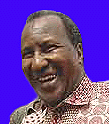
|
CHAIRMAN AFRICAN UNION
Alpha Oumar Konare, 57, the former president of Mali, has been elected the new chairperson of the African Union Commission. He should begin a four-year term as the head of the AU secretariat from September 2003, when he takes over from the outgoing interim chairperson, former Ivorian foreign minister, Amara Essy. Konare governed Mali as a democratically elected head of state for two terms, from 1992 to 2002. Before becoming president, Konare was a university professor of history and archaeology. Konare’s supporters praise him for being a dedicated pan-Africanist. He is also credited with finding a negotiated settlement to the Tuareg rebellion in the north.
|
|
KUNTA KINTE FOUNDATION
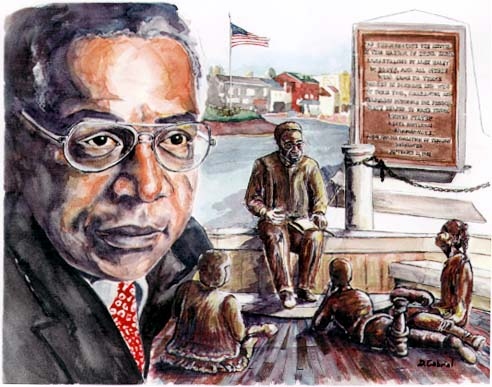
|
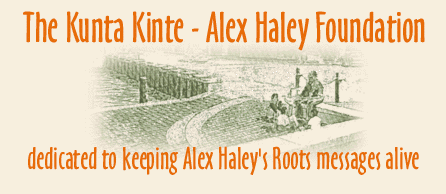
The Kunta Kinte - Alex Haley Foundation is dedicated to fostering the exploration, rediscovery, and preservation of African American history, culture, archaeology, and genealogy. The Foundation further encourages the search for ethnic "roots" among Americans of all ethnic origins. One role of the Foundation is to continue the symbolic journey begun by the late author Alex Haley in his quest for his own cultural heritage as reflected in his Pulitzer prize-winning book Roots. The Foundation is a 501(c)(3), non-profit, tax-exempt organization.
|
Kwanzaa
Information Center

|
KWANZAA is derived from the Kiswahili phrase "matunda ya kwanza", which means "first fruits of the harvest" which is a depiction of the celebration of harvesting the first crops in traditional Africa. Kwanzaa is an Afrocentric centered institution that is celebrated by people of African descent in North America, the Caribbean and other parts of the African Diaspora. It was created in 1966 by M. Ron Karenga. The celebration of Kwanzaa is a means for Black people to reaffirm their commitment to themselves, their families, their community, and the black struggle for equality. There are seven days of Kwanzaa (The Black Cultural Celebration of the holiday season) December 26th thru Jan 1st. Each day focuses on a specific principle, so there are seven principles. Kwanzaa for the most part is an unknown as such in Africa since it is an African American Holiday rooted in some African Traditions that have to do with the celebration of Harvest and principles of life, great idea, great holiday and some day it may be celebrated in Africa as it is in America but not presently.
|
|
To have your URL also added to these Internet gateways, please forward an
e-mail request to the LinkMaster at:
|
LinkMaster
GOTO Alphabetic links
1
2
3
A
B
C
D
E
F
G
H
I
J
K
L
M
N
O
P
Q
R
S
T
U
V
W
X
Y
Z
All rights reserved!
|
|
|---|
|